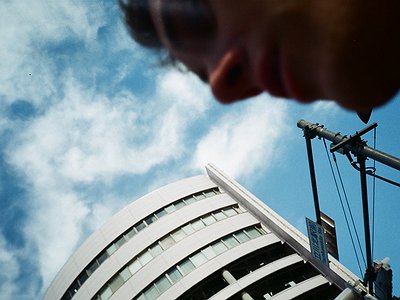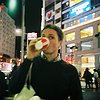Part 2
Could you take us through a day in your life, from a possible morning routine through to your work? Do you have a fixed schedule? How do music and other aspects of your life feed back into each other - do you separate them or instead try to make them blend seamlessly?
I'm a freelance worker, so it changes from day to day, but typical days involve packaging orders, going to the post office, playing with my daughter when she has time, washing dishes, doing laundry, working part-time in east Tokyo, commuting, meeting friends after work, visiting record shops to sell records and cds, dinner with family, staying up late working on music, and walking in the park at night.
Could you describe your creative process on the basis of a piece or album that's particularly dear to you, please? Where did the ideas come from, how were they transformed in your mind, what did you start with and how do you refine these beginnings into the finished work of art?
"Text me when you wake up" from the album "Xiexie". In China on the maglev train, it was speeding through the countryside, rain was misty and the distance was foggy, and the dark green and watery farm fields passed by in the window. Large towers of apartment buildings were under construction in the distance, and new illuminated freeways spun by, without a car in sight. The force of the train, and the swaying on the tracks made me drowsy, and I fell in and out of sleep. I thought about when you told me "text me when you wake up". Have you noticed generational differences in relationships? Maybe you were born 10 years earlier, and something as simple as texting wasn't around for you - but the other person grew up with it. I remember "call me when you wake up", but this was different. And texting has little emotion and can be easily misinterpreted. I don't know how many problems this has caused. I think of that, and how I feel overwhelmed having to text good morning and goodnight everyday, I always seemed annoyed. Time passes and you're no longer with that person, and I wake up and look at my phone, but there's nothing to see. Those things you wish would go away, eventually you wish were there again. Then you're awake, you're on the train, and she's there next to you.
There are many descriptions of the ideal state of mind for being creative. What is it like for you? What supports this ideal state of mind and what are distractions? Are there strategies to enter into this state more easily?
I can't think of any ideal situation, and I certainly wouldn't welcome hardship, but it is bountiful for creating ideas or having experiences that lend a heavy emotional hand to any creation. I think it's important to appreciate and use whatever you have, regardless of how difficult it may be. Having no feeling is much harder.
How is playing live and writing music in the studio connected? What do you achieve and draw from each experience personally? How do you see the relationship between improvisation and composition in this regard?
Typically, my music is very personal and not exactly representing all kinds of experiences I feel totally happy about re-experiencing for 30 minutes in a live setting; but I'm trying to find some sort of reflection in this process. This is something I'd like to work on, but it's slow, especially when you do your own booking and aren't any good at marketing yourself like I am. It's easy to confront your feelings and process your creations in the comfort of your workspace with only a view of the rainy window and your house plants, but it's a different thing standing in front of 30 people looking at you. There's something to find in each space, even if it is a bad feeling. Everywhere sounds different, and it can be interesting to explore that place with a sound you've made, and try to find some connection with that place, or at the least, place my feeling into the place itself, even if only for a short time. When people ask "how was it" after the show, it's hard not to have a comical look on your face after you feel like you've been stabbing yourself in the heart for 30 minutes, but I'm trying to look at it in a better way more and more.
How do you see the relationship between the 'sound' aspects of music and the 'composition' aspects? How do you work with sound and timbre to meet certain production ideas and in which way can certain sounds already take on compositional qualities?
Sometimes it just takes finding the right repeating point for loops, and finding that revolution that gives you the right feeling. When I move the tape around and find the point where I don't want to turn it off, it hits something right. It's almost never about creating something with an idea that "this should sound like this", but creating music or sampling music, then finding where it connects to you, whether it's backwards, 50% slower, or..
Our sense of hearing shares intriguing connections to other senses. From your experience, what are some of the most inspiring overlaps between different senses - and what do they tell us about the way our senses work? What happens to sound at its outermost borders?
When it triggers something inside you, some relation to something deeper, when you actually feel something, that's all that you need.
Art can be a purpose in its own right, but it can also directly feed back into everyday life, take on a social and political role and lead to more engagement. Can you describe your approach to art and being an artist?
It's a diary of my everyday life. I don't share every page, and I understand less of it, but it's there, hopefully for some purpose.
It is remarkable, in a way, that we have arrived in the 21st century with the basic concept of music still intact. Do you have a vision of music, an idea of what music could be beyond its current form?
I don't have any idea, but I'm sure it will be great.






